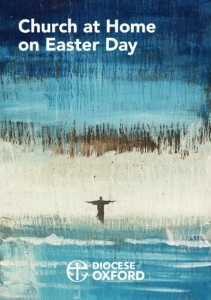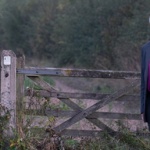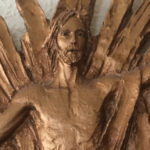I love the Easter stories in the gospels. The ending is the best part of the book. I love the gentleness of Jesus in John as Mary meets him in the garden, as he breathes his Spirit into his disciples to strengthen them, as he restores Peter by the lakeside. I love the story of the road to Emmaus in Luke and his gentle listening, the way their hearts burn as he unfolds the scriptures and the way Jesus is made known in the breaking of the bread. I love the sense of power and purpose in Matthew as the disciples are given the great commission to go into all the world and make disciples, which still goes on to this day.
But there is one gospel ending I have never understood or focussed on at Easter until this year: the ending of Mark. Three women come to the tomb where Jesus was laid, bringing spices. The stone is rolled back. They enter the tomb. They see a young man in a white robe sitting to one side. He tells them that Jesus is risen and they are to go to Galilee and meet him there. And then we read this: “So they went out and fled from the tomb, for terror and amazement had seized them; and they said nothing to anyone, for they were afraid.”
And there the gospel ends. Scholars wonder if the original ending was lost. If you look carefully at Mark 16, you will see two other endings are added to the story. The oldest manuscript though end with a very short sentence: they were afraid because…
This year to end on a note of fear seems right. Our world and our country are in the midst of a natural disaster. We are reminded every day of our mortality. Many of our families and friends are already touched by illness or by death.
In such a time it is natural to be afraid and we want to run away. One of the deepest parts of being human is a strong desire for our lives to go on: a longing for eternity. But that longing collides with the dreadful truth that one day we will die.
In this time of fear, the Church is called to come back again to the very centre of our faith: the death and resurrection of Jesus Christ and ponder what that resurrection means. Death has been overcome, put into reversed and conquered. Jesus has opened up the way to new and eternal life. We grieve for those we have lost, but we do not grieve as those who have no hope. As we shall say in a moment together, we believe in resurrection.
If you read the New Testament carefully, the first disciples found the resurrection of Jesus hard to understand and hold onto. It is a truth so big it turns our world upside down and inside out. Thomas famously did not believe until he could see and touch the Lord. Luke describes the disciples as startled and terrified: joyful but still disbelieving and wondering. In Mark, the women are at first afraid at such a great and deep truth.
Jesus is risen and that changes everything. Death becomes a gateway and not an ending. Life is lived in the light of eternity. Love endures beyond the grave. The meal we share today is a foretaste of a banquet in heaven. This invitation to life is open to everyone. There is no need to be afraid.
Because of Jesus, resurrection is the pattern of the world. There is no doubt that these days are terrible and difficult: perhaps the worst we will ever live through. But there is no doubt that there will be a resurrection and rebuilding and resetting of our lives, of our families, of our economy and of our world. We will meet again. There will be lessons we can learn in this season of what is really important and essential. In the meantime we pray and love and hope and encourage one another in the faith of the resurrection.
Because of Jesus we are able as the people of God to face our mortality and see beyond it. Christ is risen. We have new hope. Because of that hope we can sing to one another as the children sing to us now: Be bold, be strong for the Lord our God is with you.
+Steven
Easter Day, 2020



 Steven Buckley
Steven Buckley